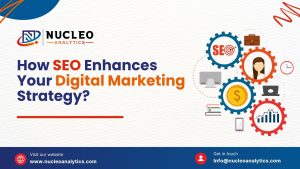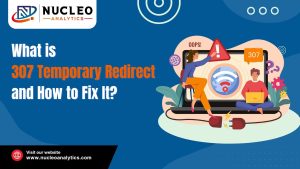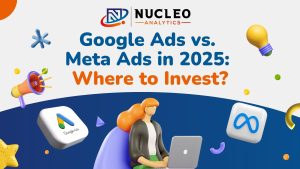How AI Is Reshaping the Future of Digital Marketing?
In the fast-paced world of digital marketing, marketers are always changing with the times to stay ahead of the competition. Among the most transformative technologies available today, artificial intelligence (AI) is one that changes things. From data analysis to tailored user experiences and automated campaigns, artificial intelligence is transforming the direction of digital marketing in formerly unthinkable ways.
Emphasizing important areas of influence, new trends, and how a top digital marketing company can help you stay ahead, this blog examines how artificial intelligence is transforming digital marketing.
Understanding AI in Digital Marketing
Artificial intelligence is the emulation of human intellect in robots built to be intelligent and learning agents. AI in digital marketing refers to technologies and algorithms used for activities such as consumer segmentation, predictive analytics, content creation, chatbots, and real-time personalization.
To find insights, automate choices, and run strategies quicker and more precisely than people, artificial intelligence systems sift enormous volumes of data. It enables advertisers to grow their activities and more precisely maximize their campaigns.
The Key Areas Where AI Is Transforming Digital Marketing
1. Personalized Customer Experiences
By examining consumer behavior, tastes, and purchasing history, artificial intelligence helps to allow hyper-personalization. Customized content, recommendations, and messages sent in real time by tools driven by machine learning can improve user happiness and raise conversion rates.
For instance, Amazon and Netflix employ artificial intelligence to suggest shows and items depending on past behavior. Up to 80% of personalized experiences have been demonstrated to increase involvement.
2. Artificial Intelligence-Driven Content Creation
Content marketing is being transformed by artificial intelligence applications such as ChatGPT, Jasper, and Copy.ai. In seconds these programs can create blog entries, product descriptions, email campaigns, and ad text.
While tone, accuracy, and originality still depend on human supervision, artificial intelligence drastically cuts the time spent developing material and generating ideas.
3. Improved consumer understanding via predictive analytics
Predictive analytics forecasts future behavior by means of historical data analysis guided by artificial intelligence. Marketers can spot valuable consumers, project turnover, and grasp buy intent.
For instance, e-commerce companies utilize artificial intelligence to recommend retargeting consumers or upsells, probably going to quit their baskets, thereby increasing retention and income.
4. Conversational intelligence and chatbots
Providing 24-hour customer assistance now depends on chatbots. Modern chatbots using natural language processing (NLP) may redirect inquiries to human agents as required, answer difficult questions, and provide answers.
The chatbot operated by Sephora enhances customer shopping by delivering recommendations of beauty products while helping users to make online appointments.
5. Using Programmatic Ads
Artificial intelligence uses automation to make ad buying more precise for targeting consumer audiences effectively. AI algorithms enable programmatic advertising to automatically bid for advertising space as it becomes available during real-time operations for precise audience targeting.
Benefits:
- Higher Return on Investment
- Lower waste in ad expenditure
- Enhanced campaign performance
6. Augmented reality and visual recognition
Image identification backed by artificial intelligence enables websites like Pinterest and Instagram to evaluate visual material in order to suggest like-minded goods or classify user interests.
Powered by artificial intelligence, augmented reality (AR) lets consumers see goods—such as furniture or makeup—in real-life environments before making a purchase, therefore lowering doubt and increasing confidence.
The Rise of Voice Search and AI Assistants
Voice search is becoming mainstream, with AI assistants like Siri, Alexa, and Google Assistant leading the charge. According to Statista, 55% of households are expected to own a smart speaker by 2025.
Implications for Marketers:
- Optimize content for voice queries (long-tail keywords and natural language)
- Focus on local SEO
- Deliver concise, conversational responses
AI in Email Marketing
AI is transforming brand interactions with consumers via email by:
- Optimizing send times
- Customizing the text and subject lines
- Separating categories according to activity and conduct
Emails driven by artificial intelligence may raise open rates by up to 41% and click-through rates by up to 30%, claims Campaign Monitor.
The Impact of AI on SEO
AI-based algorithms—such as RankBrain and BERT—are used by search engines like Google to grasp user intent and provide more pertinent answers. Marketers now have to:
- Focusing on user experience, content quality, and the best content marketing strategy.
- Rich snippets using structured data
- Incorporate long-form material and conversational questions.
By examining top-performing sites and recommending changes, AI tools like Surfer SEO and Clearscope also assist in maximizing content.
Social Media and AI
AI helps manage social media platforms efficiently through:
- Sentiment analysis to gauge brand perception
- Image and video tagging
- Predictive analytics to determine the best times to post
AI-powered platforms like Hootsuite and Buffer assist with automated scheduling and engagement monitoring.
Example: Instagram’s Explore page uses AI to recommend content based on user preferences and engagement patterns.
Benefits of AI in Digital Marketing
| Benefit | Description |
| Efficiency | Automates repetitive tasks like data entry, reporting, and email marketing. |
| Scalability | Easily manages large-scale campaigns with minimal manual intervention. |
| Accuracy | Reduces human error in analytics and targeting. |
| Cost-Effectiveness | Maximizes ROI by targeting the right audience and minimizing ad spend. |
| Customer Satisfaction | Enhances user experience through personalization and quick response times. |
Challenges and Ethical Concerns
Although artificial intelligence has great possibilities, it raises several issues:
1. Privacy of data: User data collection and processing create privacy problems. Marketers have to guarantee adherence to standards including GDPR and CCPA.
2. Discrimination and bias: If taught on non-diverse or incorrect datasets, artificial intelligence can reinforce prejudices. Regular examination of algorithms for fairness is really vital.
3. Overindulgence in Automation: Too much automation might lower human creativity and result in robotic interactions or homogeneous material.
4. Job Deplacement: Particularly in professions involving repetitive operations, artificial intelligence might replace some marketing roles. It also generates new professions concentrated on ethical monitoring, artificial intelligence training, and strategy.
Emerging Trends in AI Marketing: What to Expect in the Near Future

1. AI-Created Videos
As platforms like Synthesia develop, artificial intelligence-generated video will become a more important component of marketing plans.
2. AI Emotion
By use of face recognition and sentiment analysis, emotion detection will enable companies to customize their communications depending on user feelings.
3. Platform for Independent Marketing
Complete campaigns from planning to execution will be carried out by fully autonomous marketing platforms with little human involvement.
4. Blockchain + Artificial Intelligence
Blockchain combined with artificial intelligence will provide digital advertising openness and confidence, therefore reducing fraud and guaranteeing real interactions.
How Businesses Should Prepare?
Companies should completely embrace the AI-driven future of digital marketing by:
- Invest in artificial intelligence tools: From analytics to content production, use AI tools that improve insight and efficiency.
- Upskill Teams: Give your marketing staff data skills and artificial intelligence awareness.
- Ensure data quality: Teach your algorithms objective, relevant, high-quality, and impartial data.
- Keep It Human: AI should enhance rather than replace human sensitivity and inventiveness.
- Focus on Ethics: Give data security, justice, and openness top priority in every artificial intelligence project.
Embrace the Future of Digital Marketing with Nucleo Analytics
Our specialty at Nucleo Analytics is enabling companies to use artificial intelligence to augment their digital marketing plans. Our staff has the knowledge and skills to help you maximize marketing, improve consumer insights, or apply data-driven content.
What sets Nucleo Analytics apart?
- Customised AI marketing solutions
- Reporting and pragmatic analytics
- Automation of campaigns in real time
- Specialized professionals are leading every action.
Let artificial intelligence do the tough work while you concentrate on growing your company and avoid letting your rivals overtake you.
Contact Nucleo Analytics now to learn more about our digital presence transformation services.
Final Thought
Artificial intelligence is the engine underlying the change in digital marketing; it is not only a buzzword. From predictive analytics to tailored content, artificial intelligence helps companies to more deliberately, effectively, and intelligibly interact with consumers.
The companies that deliberately embrace artificial intelligence—balancing automation with empathy—will spearhead the march into a more data-driven, customer-centric future.
Whether you run a worldwide company or a startup, knowing and using artificial intelligence into your marketing plan is not optional; it is rather necessary.
Future-proof your marketing plan here.
Work with Nucleo Analytics right now to boldly enter the AI-driven digital marketing age.
















